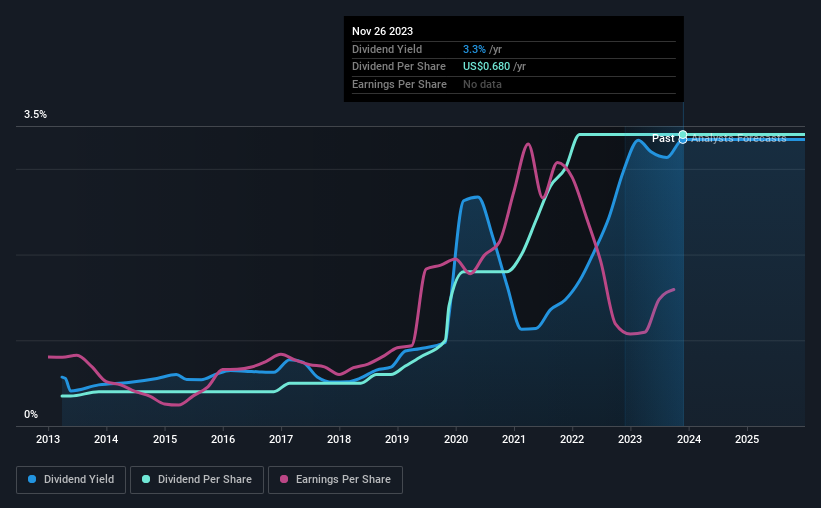MVB Financial Corp. (NASDAQ:MVBF) Looks Interesting, And It's About To Pay A Dividend
Regular readers will know that we love our dividends at Simply Wall St, which is why it's exciting to see MVB Financial Corp. (NASDAQ:MVBF) is about to trade ex-dividend in the next three days. The ex-dividend date is one business day before the record date, which is the cut-off date for shareholders to be present on the company's books to be eligible for a dividend payment. The ex-dividend date is of consequence because whenever a stock is bought or sold, the trade takes at least two business day to settle. Therefore, if you purchase MVB Financial's shares on or after the 30th of November, you won't be eligible to receive the dividend, when it is paid on the 15th of December.
The company's next dividend payment will be US$0.17 per share, and in the last 12 months, the company paid a total of US$0.68 per share. Last year's total dividend payments show that MVB Financial has a trailing yield of 3.3% on the current share price of $20.34. If you buy this business for its dividend, you should have an idea of whether MVB Financial's dividend is reliable and sustainable. So we need to check whether the dividend payments are covered, and if earnings are growing.
View our latest analysis for MVB Financial
If a company pays out more in dividends than it earned, then the dividend might become unsustainable - hardly an ideal situation. MVB Financial paid out a comfortable 37% of its profit last year.
Companies that pay out less in dividends than they earn in profits generally have more sustainable dividends. The lower the payout ratio, the more wiggle room the business has before it could be forced to cut the dividend.
Click here to see the company's payout ratio, plus analyst estimates of its future dividends.
Have Earnings And Dividends Been Growing?
Companies with consistently growing earnings per share generally make the best dividend stocks, as they usually find it easier to grow dividends per share. If earnings fall far enough, the company could be forced to cut its dividend. That's why it's comforting to see MVB Financial's earnings have been skyrocketing, up 21% per annum for the past five years.
The main way most investors will assess a company's dividend prospects is by checking the historical rate of dividend growth. MVB Financial has delivered an average of 26% per year annual increase in its dividend, based on the past 10 years of dividend payments. Both per-share earnings and dividends have both been growing rapidly in recent times, which is great to see.
The Bottom Line
Should investors buy MVB Financial for the upcoming dividend? Companies like MVB Financial that are growing rapidly and paying out a low fraction of earnings, are usually reinvesting heavily in their business. This is one of the most attractive investment combinations under this analysis, as it can create substantial value for investors over the long run. MVB Financial ticks a lot of boxes for us from a dividend perspective, and we think these characteristics should mark the company as deserving of further attention.
Ever wonder what the future holds for MVB Financial? See what the four analysts we track are forecasting, with this visualisation of its historical and future estimated earnings and cash flow
A common investing mistake is buying the first interesting stock you see. Here you can find a full list of high-yield dividend stocks.
Have feedback on this article? Concerned about the content? Get in touch with us directly. Alternatively, email editorial-team (at) simplywallst.com.
This article by Simply Wall St is general in nature. We provide commentary based on historical data and analyst forecasts only using an unbiased methodology and our articles are not intended to be financial advice. It does not constitute a recommendation to buy or sell any stock, and does not take account of your objectives, or your financial situation. We aim to bring you long-term focused analysis driven by fundamental data. Note that our analysis may not factor in the latest price-sensitive company announcements or qualitative material. Simply Wall St has no position in any stocks mentioned.

